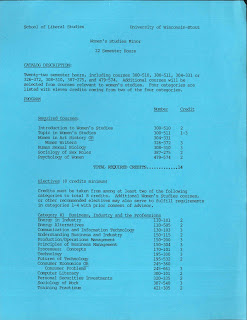Women’s History Month is a time to reflect and celebrate the many accomplishments and contributions of women to society. Here at Stout, the Women, Gender, and Sexuality Studies program has a long history of educating students not only about feminism from an academic perspective but how it applies in a practical setting.
The earliest proposal of a Women’s Studies course I could find in Stout’s archive dates back to 1974. At the height of 2nd wave feminism, the topics discussed in this class reflected many of the same discourses and ideologies that were found in many feminist circles of the time. In the course, students discussed what sexism was, where it came from, how it affected their lives, and what could be done to make society better. They also discussed the Women’s Movement, feminism, and female sexuality.
It should be noted that, like the Women’s Movement of the 1970s, within the first few years of Women’s Studies at Stout there was very little discussion of identities other than able-bodied, heterosexual, white, cis-gendered women. With the turn of the century, there was more effort to discuss other cultures, races, identities, and ages with classes like Multicultural Philosophy and Women and Minorities in Management and Lifespan Sexuality. These also reflect the continued effort to market the minor as a way of becoming more marketable after graduation.
In 2007, Stout became Wisconsin’s Polytechnic University, and with this change, the perception of Stout shifted. In a proposal to change the Women’s Studies minor to a polytechnic Women and Gender Studies minor, a section titled “Not Very Likely To Encourage Her Daughter To Attend A Polytechnic: Detailed Statistics, Analysis, and Planning,” parents were quoted saying they would not encourage their daughters to apply for a polytechnic unless they had specific interest in a STEM field or showed a high aptitude for math or science.
With a Women, Gender, and Sexuality Studies minor, Stout is better equipped to push back against the misconception that came with a polytechnic designation and make a more welcoming space for everyone to have an education with a diverse point of view.
With classes like Gender in Cross Cultural Perspectives, People Process Culture, and Healthcare Dilemmas and Gender and Science, Technology, Engineering and Mathematics, the Women, Gender, and Sexuality Studies minor was able to further Stout’s commitment to career readiness for all students while also expanding discussions to include more identities.
Written and Researched by Meagan Ginnaty-Moore,
She/her/hers, UW-Stout Archives Student Worker
















